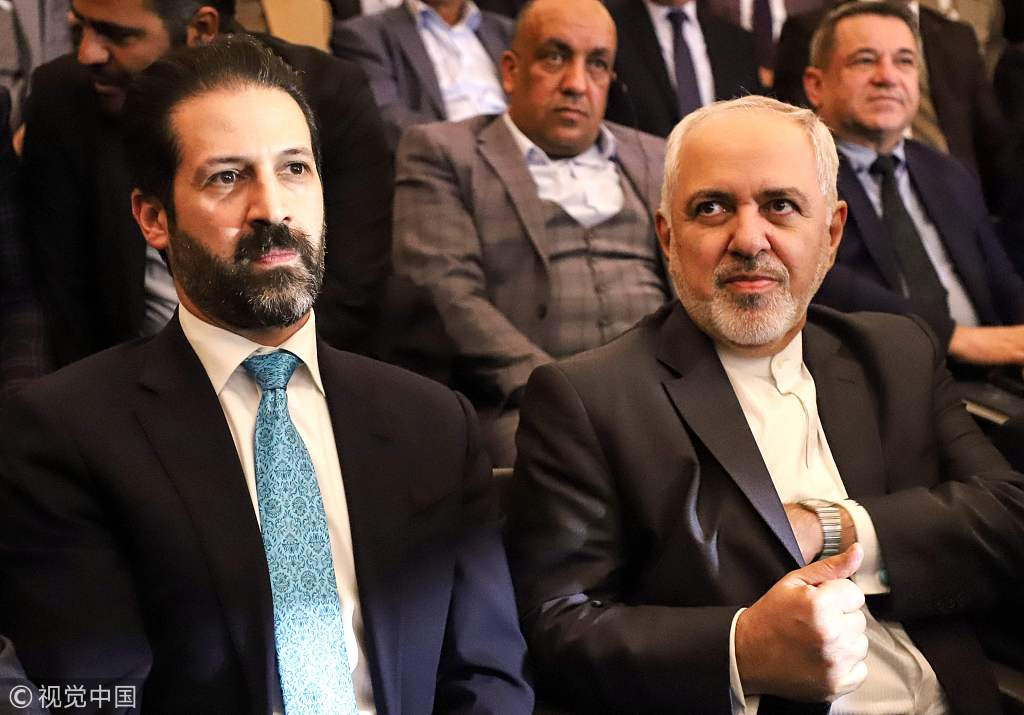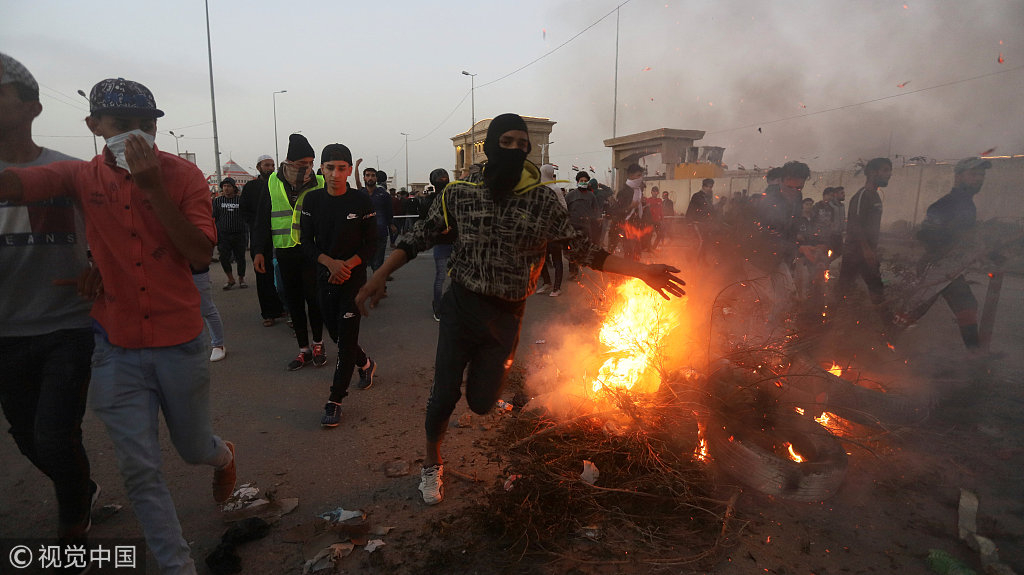
Middle East
21:06, 20-Feb-2019
Future trajectory of Iraqi politics: Caught between Iran and U.S.
Updated
07:29, 21-Feb-2019
Wang Yan

After pulling out from the Iran nuclear deal last year, Washington is hoping that Baghdad will join its regional camp to isolate Tehran. However, Baghdad seems reluctant to cut ties with its neighbor and jeopardize the gas supply Iran has been providing for the energy-starved country.
Last week, United States Acting Secretary of Defense Patrick Shanahan met with Iraqi Prime Minister Adel Abdul Mahdi, trying to woo Baghdad.
The two sides reached a consensus that the U.S. military presence in Iraq is only at the consent of the Iraqi government, and the current 5,500 U.S. soldiers are aiming to "aid the strengthening of the security capabilities of Iraq."
But the announcement indicates little success in watering down the anti-American atmosphere among politicians across the political spectrum.
This week, Iraqi party leaders announced that they are putting efforts together to convene an emergency session of parliament on the U.S. presence in Iraq.
Whether or not parliamentarians will respond to the request is unknown.
The amounting voice to push the U.S. out
During the fight against ISIL, the U.S. was physically instrumental in training and equipping Iraqi forces. With concrete territory seized back from ISIL, the U.S. has been able to set up a fairly positive image in Iraq.
However, the voice to oust the U.S. military presence has been renewed lately, prompted by a statement by Donald Trump during a CBS interview. He said that he wants to keep troops in the country to “watch Iran.” After the statement came out, even Iraqi President Barham Salih, formerly thought to be leaning towards Washington, said, "Don't overburden Iraq with your own issues."
Abdul Amir al-Mayahi, a Member of Parliament for the Fatah Alliance, claimed that "U.S. troops crossed the border into Iraq without providing prior notification to the Iraqi government, thus breaching the Strategic Framework Agreement." By this, Mayahi refers to the U.S. forces entering Anbar Province from the Syrian border and allegedly establishing two new military bases, right after Trump's sudden visit to the Al Asad Airbase.
Based on the Strategic Framework Agreement, which was signed by the U.S. and Iraq in 2008, American forces are prohibited from using "Iraqi land, sky, and water to attack any other country.” Also, this agreement only permits the presence of U.S. advisers and instructors who work to improve Iraq's security, not military forces.
Defiance from Baghdad
Among all the clamor for U.S. troops to leave, a fraction of politicians argue that the continued presence of American troops can counteract Iranian influence on the government.
According to the latest analysis of Alustakilla (IIACSS), a research center based in Baghdad, the percentage of Iraqi Shiites who have favorable attitudes toward Iran decreased from 88 percent in 2015 to 47 percent in the fall of 2018; while those who have unfavorable attitudes toward Iran increased from 6 to 51 percent.

Iranian Foreign Minister Mohammad Javad Zarif (R) sits alongside Qubad Talabani, Deputy Prime Minister of the Kurdistan region of Iraq, during a joint-trade conference between the Kurdistan region and Iran, on January 15, 2019. /VCG Photo
Iranian Foreign Minister Mohammad Javad Zarif (R) sits alongside Qubad Talabani, Deputy Prime Minister of the Kurdistan region of Iraq, during a joint-trade conference between the Kurdistan region and Iran, on January 15, 2019. /VCG Photo
With all the talk and promises made by Iraqi politicians to assure Iraq's sovereignty apart from Tehran, considering the profoundly bonded culture identity, as well as the religious, demographic and economic ties between the two, there is little reason to believe that the influence and appeal of Iran will vanish quickly.
History lecture aside, European nations have already set up a legal financial mechanism with Iran to bypass U.S. sanctions in order to hold the Iran nuclear deal together. Hence, Baghdad sees no reason to comply with the pressure from Washington.
Iraqi Prime Minister Adel Abdul-Mahdi made it explicit that Iraq will not take part in sanctions against Iran because Iraq has “suffered from the embargo and realizes the damage that people incur from its consequences.”
This month, the central banks of both sides made a deal to allow Iranian banks to open dinar-denominated accounts in Iraqi banks, which will permit Iranian exporters to do business using Iraqi banks and help facilitate trade between the two countries.
On top of the trade connections between the two, Baghdad can't afford to stop buying energy from Iran right away, even it is rooted in Trump's sanctions package. Iraq is seeing a rising number of unprecedentedly violent protests bred from an extremely low employment rate. A further shortfall in power would incite more radical political instability.
Since 2015, Iraq has been importing between 1,500 and 2,000 MW from Iran in a bid to cover its domestic production shortfall. According to the Iraqi Minister of Electricity, Iraq needs more than 23,000 MW of electricity per hour to ensure a nonstop supply to homes and public buildings. However, the domestic production capacity cannot reach 15,700 MW.
Last year Iran cut the electricity supply to Iraq three times, due to its own domestic production capacity shortfall. Additionally, Tehran threatened to cut the flow of rivers that provide clean water to Iraq, their downstream neighbor. According to Iraqi Minister of Agriculture, if Iran cuts the flow, an approximate 7 billion cubic meters will be cut towards the western and northern regions of Iraq, costing about 8 billion U.S. dollars.

Iraqi demonstrators gather during an anti-government protest in front of the Governorate building in Basra, Iraq, December 21, 2018. /VCG Photo
Iraqi demonstrators gather during an anti-government protest in front of the Governorate building in Basra, Iraq, December 21, 2018. /VCG Photo
Sixteen years have passed and Iraq is still struggling to recover from the U.S.-led invasion and a series of catastrophic sanctions imposed on the country. It might require a more convictive approach for the U.S. to persuade Iraq to join the sanctions camp against Iran than what Trump described in his State of the Union as Iranians "do bad, bad things."
(Cover image: Election campaign poster of Nouri al-Maliki, Iraq's Shia Prime Minister, displayed in Baghdad, March 2018. /Photo courtesy of Education for Peace in Iraq)

SITEMAP
Copyright © 2018 CGTN. Beijing ICP prepared NO.16065310-3
Copyright © 2018 CGTN. Beijing ICP prepared NO.16065310-3